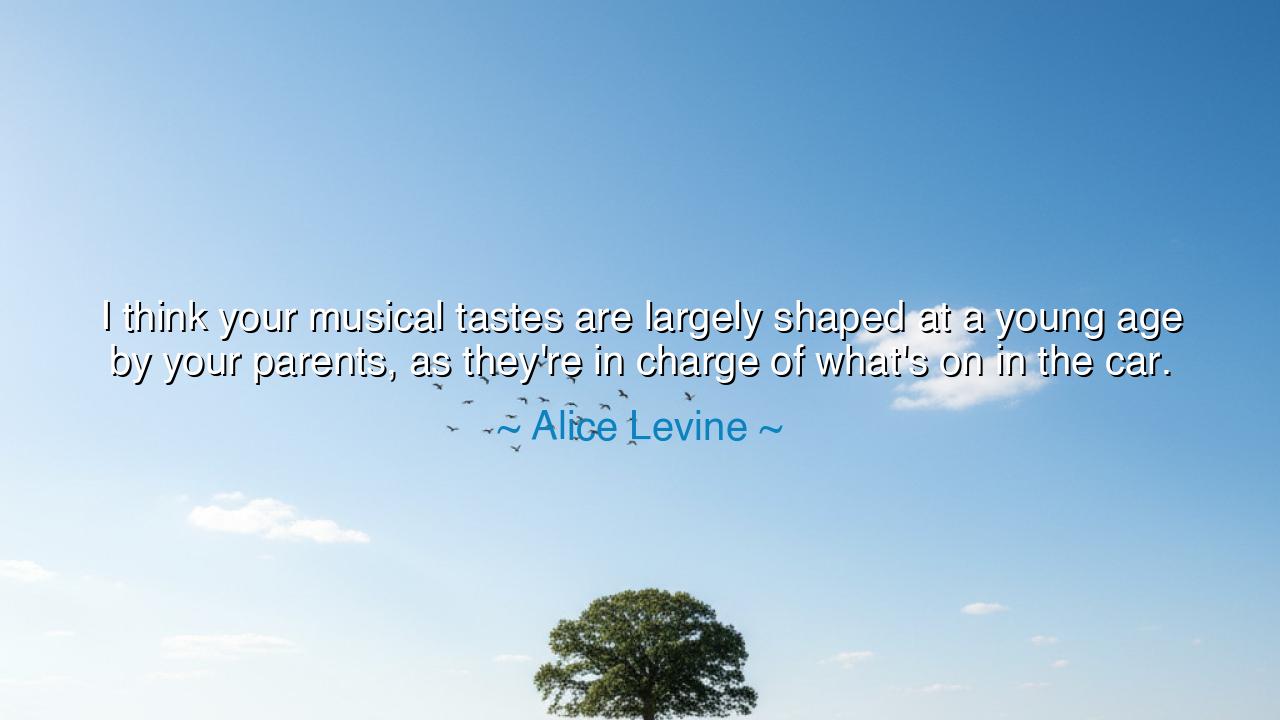
I think your musical tastes are largely shaped at a young age by
I think your musical tastes are largely shaped at a young age by your parents, as they're in charge of what's on in the car.






In the grand tapestry of life, the threads of music weave through our hearts from the very beginning. The words of Alice Levine, “I think your musical tastes are largely shaped at a young age by your parents, as they're in charge of what's on in the car,” carry within them a profound truth about the influence of our early environments. In the journey of life, we are shaped by many forces, but one of the most powerful is the soundtrack to which we are exposed as children. From the lullabies sung to us as infants to the songs played in the family car, these early musical choices become imprinted upon our souls, guiding the way we hear, understand, and express ourselves through music for the rest of our days.
What, then, is the meaning of musical tastes being “shaped at a young age by your parents”? From the moment we are born, our parents are the first artists who paint upon the canvas of our lives. Their choices, their tastes, and their actions influence how we view the world, often before we even have the ability to understand. The car, that humble vessel where families travel from place to place, becomes the crucible in which we are exposed to the first sounds that will accompany us through our childhood and beyond. Whether it’s the classical symphonies of Beethoven or the rock anthems of the ‘70s, the music we hear in those early years shapes our emotions, our thoughts, and, in many ways, the core of who we become.
Consider the example of Beethoven, the son of a strict and demanding father who sought to cultivate the genius within his son from an early age. Beethoven’s father recognized the power of music to mold and influence, and so he subjected young Ludwig to rigorous training, ensuring that his musical foundation was strong. This early exposure to music, shaped by his father’s choices, led to the creation of the great symphonies and sonatas that would define his legacy. Beethoven’s story is a testament to the power of early musical exposure—how the music of our youth, shaped by those who care for us, becomes the language through which we express ourselves and navigate the world.
Let us also turn to the world of jazz and the life of Miles Davis, whose musical journey began long before he picked up a trumpet. Born into a family where music was ever-present, Davis was influenced by the sounds and rhythms of his time, but it was the early foundation set by his parents and the jazz records they played that would later shape his unique sound. As a child, Davis absorbed the musical culture around him, and though he later broke away to forge his own path, his formative years, surrounded by the songs of his youth, were a crucial part of his musical identity. His early exposure to the world of jazz helped him become one of the most influential musicians in history, proving that the musical tastes imparted by parents play a foundational role in the development of an artist.
The impact of parents on musical tastes is not just about the exposure to certain genres, but the emotional landscape they create around music. Think of the family gatherings, the road trips, or the quiet moments at home when music fills the air. These are the moments that bind us to the music of our youth, creating an emotional connection that lasts a lifetime. It is in these moments that we find comfort, joy, and nostalgia, each song a memory, each note a reminder of where we came from. The music chosen by our parents, played in those everyday moments, becomes the soundtrack of our lives, guiding us like a familiar voice when we navigate the highs and lows of adulthood.
In this, we are reminded that music is not just an art form, but a cultural inheritance, passed down from one generation to the next. Each song carries with it the emotions, stories, and experiences of those who came before us. To teach our children about music is not simply to offer them a tool for entertainment, but to give them a connection to their heritage, a bridge between the past and the future. The songs we play in the car, the tunes we sing, are more than just noise—they are the carriers of memory, the transmitters of legacy, and the foundations of a child’s understanding of the world.
So, the lesson is clear: the musical tastes we develop as adults are often deeply rooted in the sounds and experiences of our youth, shaped by the environment our parents provide. This is a call to action for all who care for the young—whether through music, storytelling, or tradition. The choices we make today will echo in the hearts of our children tomorrow. Let us offer them not just music, but a legacy that will shape their journey, enrich their lives, and guide them toward their own understanding of the world. Let us create soundtracks of love, joy, and wisdom that will endure long after the car ride is over, and the music fades.






AAdministratorAdministrator
Welcome, honored guests. Please leave a comment, we will respond soon